英汉翻译2
- 格式:ppt
- 大小:215.00 KB
- 文档页数:28
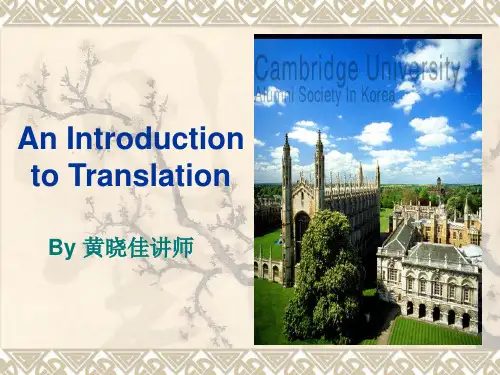
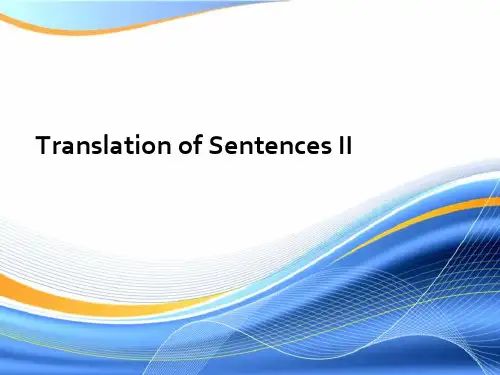
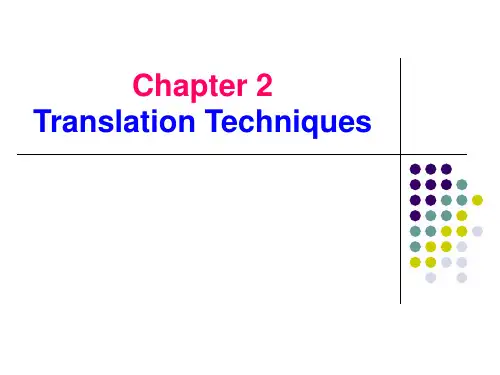
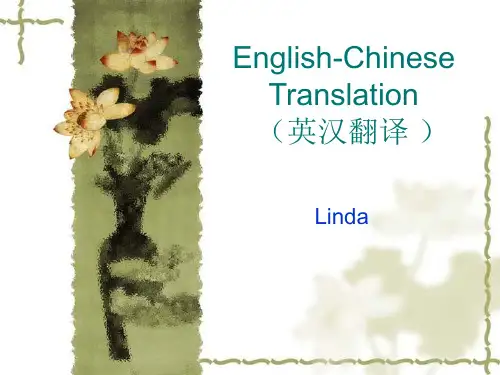
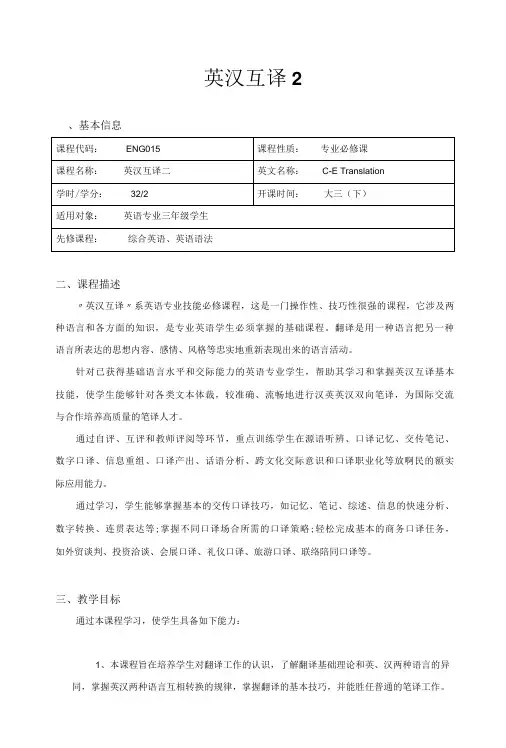
英汉互译2、基本信息二、课程描述〃英汉互译〃系英语专业技能必修课程,这是一门操作性、技巧性很强的课程,它涉及两种语言和各方面的知识,是专业英语学生必须掌握的基础课程。
翻译是用一种语言把另一种语言所表达的思想内容、感情、风格等忠实地重新表现出来的语言活动。
针对已获得基础语言水平和交际能力的英语专业学生,帮助其学习和掌握英汉互译基本技能,使学生能够针对各类文本体裁,较准确、流畅地进行汉英英汉双向笔译,为国际交流与合作培养高质量的笔译人才。
通过自评、互评和教师评阅等环节,重点训练学生在源语听辨、口译记忆、交传笔记、数字口译、信息重组、口译产出、话语分析、跨文化交际意识和口译职业化等放啊民的额实际应用能力。
通过学习,学生能够掌握基本的交传口译技巧,如记忆、笔记、综述、信息的快速分析、数字转换、连贯表达等;掌握不同口译场合所需的口译策略;轻松完成基本的商务口译任务,如外贸谈判、投资洽谈、会展口译、礼仪口译、旅游口译、联络陪同口译等。
三、教学目标通过本课程学习,使学生具备如下能力:1、本课程旨在培养学生对翻译工作的认识,了解翻译基础理论和英、汉两种语言的异同,掌握英汉两种语言互相转换的规律,掌握翻译的基本技巧,并能胜任普通的笔译工作。
2、学生通过一学期的学习和训练,能基本掌握英汉语言的显著差异,能够在达意、准确、连贯和忠实四个层面不断提高笔译水平;能够针对不同本文语境,流畅地进行汉英英汉双向,尤其是汉英笔译工作。
3、通过本课程的学习,要求学生能运用翻译理论和技巧将英美报刊文章及文学作品译成汉语,或将我国报刊、杂志上的文章或一般文学作品译成英语,翻译速度为每小时450 个英文单词左右,译文忠实于原著,语义流畅。
四、课程目标对毕业要求的支撑五、教学内容第1 章Going Global and Translation (支撑课程目标2、3)重点内容:翻译助力“走出去”的意义、条件、方法难点内容:中国文化走出去,翻译如何行教学内容:1、走出去的困惑2、名家推荐3、翻译思维4、跨文化交际意识5、翻译职业意识第2章Lexical Selection (支撑课程目标1、2、3)重点内容:词义选择难点内容:语篇中的词义选择教学内容:1、词语的意义2、语境意义3、搭配意义4^原型意义5、翻译评析第 3 章Variety of Translation重点内容:一词多义的翻译难点内容:语篇中的一词多义现象教学内容:1、汉语词语翻译的多样性2、汉语成语翻译的多样性3、汉语句子翻译的多样性4、翻译评析(TEM8)第 4 章Equivalence重点内容:对等译法难点内容:意义对等而非形式对等教学内容:1、警惕“假朋友”2、语境辨析与逻辑常识3、成语的对等译4、谚语的对等译6、翻译评析第 5 章Amplification, Reduction重点内容:增词与删减难点内容:增词与删减策略的语篇运用教学内容:1、出于语法需要的增词2、出于语义与修辞需要的增词3、范畴词删减4、语义重复的删减第 6 章Transproperty重点内容:词类转换难点内容:转性译法的运用教学内容:1、汉语动词转移2、汉语名词转移3、汉语形容词或副词转移4、翻译评析第7 章Hypotaxis & Parotaxis重点内容:意合与形合难点内容:意合向形合的转换教学内容:(支撑课程目标1、2)(支撑课程目标1、2、3)(支撑课程目标1、2)(支撑课程目标1、2)(支撑课程目标1、2、3)1、汉语意合的特点2、意合的实现手段4、英语形合的特点5、形合的实现手段6、翻译评析第8 章Documentary Translation (支撑课程目标2、3)重点内容:讲好中国故事,再议文献翻译难点内容:逻辑、严谨、选词教学内容:1、当今时代的中国故事2、译文的严谨性3、译文的逻辑性4、斟酌选词留有余地5、头重脚轻与头轻脚重六、教学安排该课程每周2学时,16周,16学时为课堂授课教学时间,16学时为课内实践教学(模拟口译、小组演练、同行评议)时间。
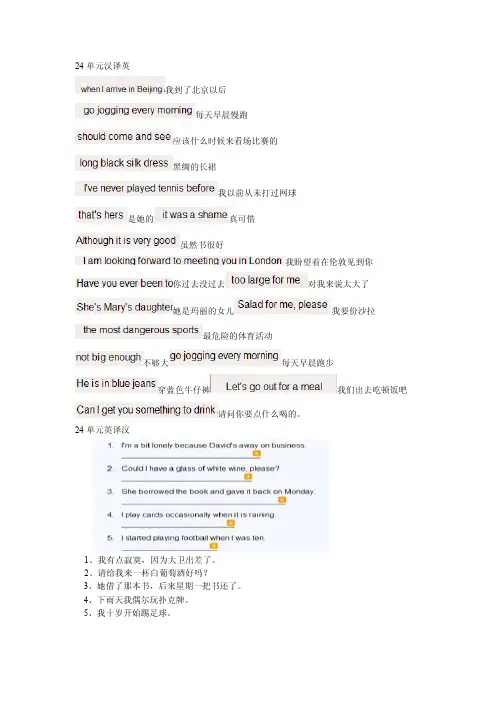
24单元汉译英我到了北京以后每天早晨慢跑应该什么时候来看场比赛的黑绸的长裙我以前从未打过网球是她的真可惜虽然书很好我盼望着在伦敦见到你你过去没过去对我来说太大了她是玛丽的女儿我要份沙拉最危险的体育活动不够大每天早晨跑步穿蓝色牛仔裤我们出去吃顿饭吧请问你要点什么喝的。
24单元英译汉1、我有点寂寞,因为大卫出差了。
2、请给我来一杯白葡萄酒好吗?3、她借了那本书,后来星期一把书还了。
4、下雨天我偶尔玩扑克牌。
5、我十岁开始踢足球。
1、我真想去看场足球赛。
2、请给我来一杯白葡萄酒好吗?3、她借了那本书,后来星期一把书还了。
4、她从没去过香港。
5、这照片使她看起来很年轻。
你觉得这儿的天气怎么样?1、房子里有点乱。
2、我真想去看场足球赛。
3、因为时间晚了,所以他们没有去看电影。
4、下雨天我偶尔玩扑克牌。
5、这件T恤衫是我的,那件是你的。
3、玛丽六岁时就开始拉小提琴了。
4、她拉小提琴进步很大。
30单元I look a bit like my grandma 我不太确定I am not sure一定是把钱包忘在must have left his wallet 一定是把它放在must have put it 非常耐心的very patient 所以我们就回家了so we went home明天下雨it rains tomorrow 如果我把餐厅扩大If I enlarge the restaurant英译汉1、我们需要重新设计网站。
2、我已经让约翰去检查计算机了。
3、这个饭店是巴黎最好的饭店之一。
4、约翰肯定有七十多岁了。
5、我正在喝茶的时候,有人偷走了我的钱包。
36单元让人修理一下你曾经和你弟弟关系处得好吗?请来杯葡萄酒是不是如果不下雨的话他的孩子不擅长体育约翰也没有看过一些吃的东西她是否能喝一杯茶从我们是孩子的时候理发了才只九岁所以我刚起床如果天气好的话给她买件礼物怎么样任何人都能做我也是告诉他六点钟和我面我也没有看过我宁愿请问我能喝点水吗如果我有更多的钱你为什么不去看乱七八糟照顾小孩他们不知道书在哪儿2、4、5、1、4 5、。
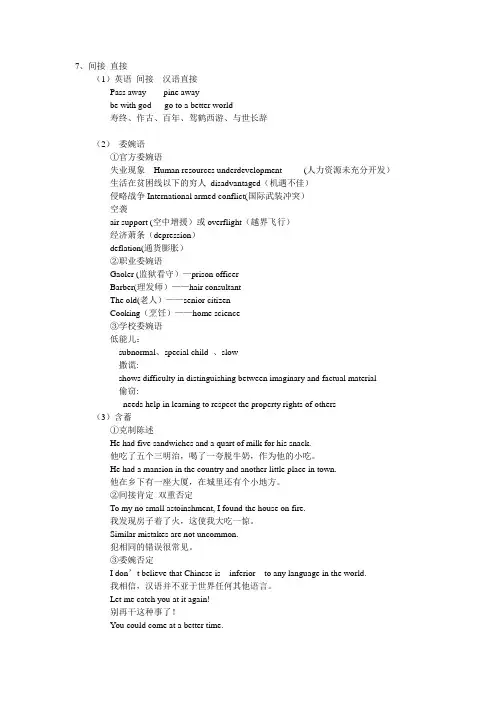
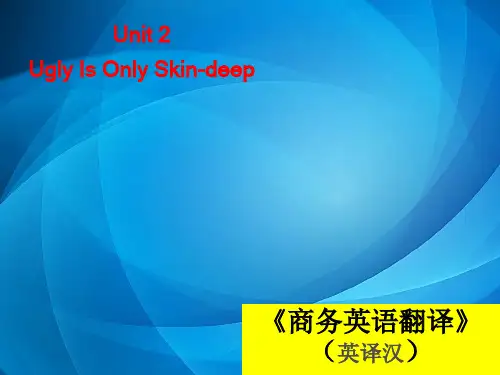
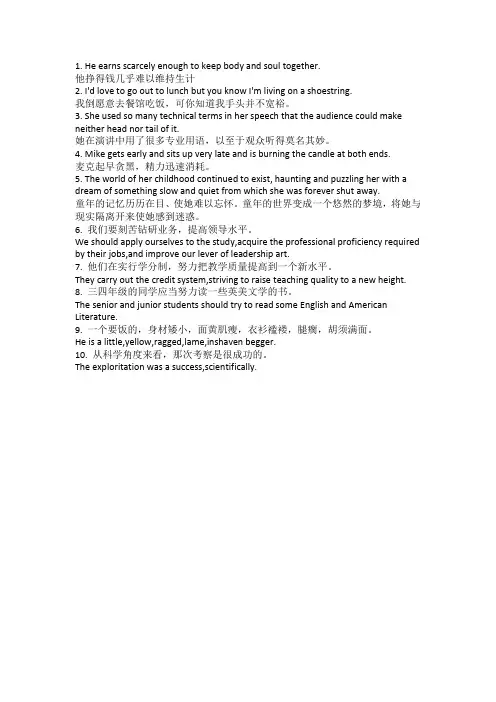
1. He earns scarcely enough to keep body and soul together.他挣得钱几乎难以维持生计2. I'd love to go out to lunch but you know I'm living on a shoestring.我倒愿意去餐馆吃饭,可你知道我手头并不宽裕。
3. She used so many technical terms in her speech that the audience could make neither head nor tail of it.她在演讲中用了很多专业用语,以至于观众听得莫名其妙。
4. Mike gets early and sits up very late and is burning the candle at both ends.麦克起早贪黑,精力迅速消耗。
5. The world of her childhood continued to exist, haunting and puzzling her with a dream of something slow and quiet from which she was forever shut away.童年的记忆历历在目、使她难以忘怀。
童年的世界变成一个悠然的梦境,将她与现实隔离开来使她感到迷惑。
6. 我们要刻苦钻研业务,提高领导水平。
We should apply ourselves to the study,acquire the professional proficiency required by their jobs,and improve our lever of leadership art.7. 他们在实行学分制,努力把教学质量提高到一个新水平。
They carry out the credit system,striving to raise teachingquality to a new height. 8. 三四年级的同学应当努力读一些英美文学的书。
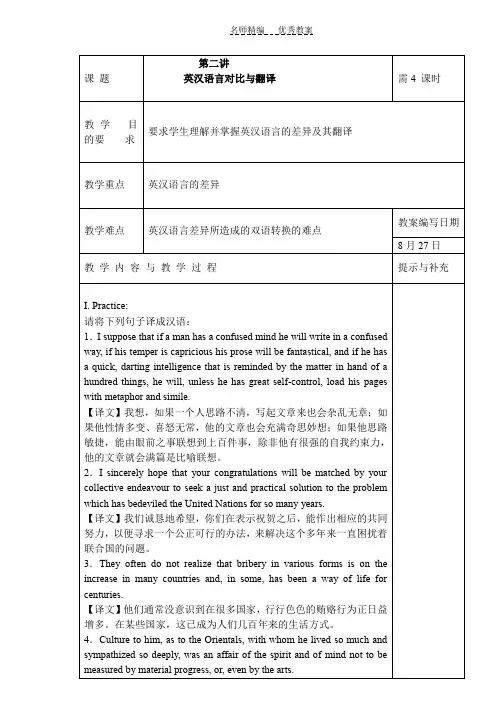
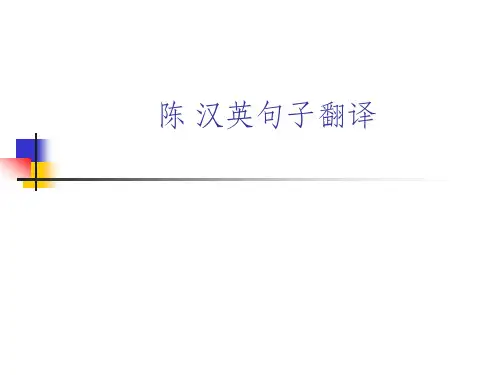
Lesson 2 Paradoxes(似非而是的论点, 自相矛盾的话) of Translating Activity 1 QuizTask 1 Translation from English to Chinese1. John is now with his parents in New York City; it is already three years since he was a bandmaster. (grammar: since从句中的过去式联系动词was 或were 是一种状态的结束。
注意:主句用一般现在时)约翰现同父母住在纽约市;他不担任乐队指挥已三年了。
2. John can be relied on. He eats no fish and plays the game. (注意短语用法)约翰为人可靠,他既忠诚又正直。
3.Don’t cross the bridge till you get to it.不必担心太早。
(不必自寻烦恼。
)4.Do you see any green in my eye?你以为我是好欺骗的吗?5.There’s no pot so ugly it cant find a lid.罐儿再丑,配个盖子不发愁。
(姑娘无论多么丑也能配个汉子。
)Task 2 Translation from Chinese into English1.“武装到牙齿”(armed to the teeth)“象牙塔”(ivory tower)趁热打铁(strike while the iron is hot)“血浓于水”(Blood is thicker than water.)2.不愛紅妝愛武裝 .To face the powder and not to powder the face.3.“情人眼中出西施” Beauty is in the eye of the beholder4.一日之计在于晨 An hour in the morning is worth two in the evening.5.無邊落木蕭蕭下不見長江滾滾來The boundless forest sheds its leaves shower by showerThe endless rivers rolls its waves hour after hourActivity 2 Questions1. Could you write down the difficulties that you have come across when doing translation? (5mins)2. The following 4 questions are mainly based on Eugene A. Nida (1993). Please think over the questions below and write down your understandings.(1)Translating is a complex and fascinating task. In fact, some scholarshave claimed that it is probably the most complex type of event in the history of the cosmos(宇宙). And yet, translating is so natural and easy that children seem to have no difficulty in interpreting for their immigrant parents. These children normally do very well until they have gone to school and have learned about nouns, verbs, and adverbs. Why?Answer:Because they then try to match the words and grammar rather than the content.(2)Most people assume(vt.假定, 设想, 采取, 呈现) that literalness(n.文字的, 表面意义上的, 无修饰的) in translating means faithfulnessto the text. Because of the many discrepancies (n.相差, 差异, 矛盾)between meanings and structures of different languages, some people have insisted that translating is impossible. What do you think?Answer: Those who insist that translating is impossible are usually concerned with some of the more marginal(adj.记在页边的, 边缘的, 边际的) features of figurative (adj.比喻的, 修饰丰富的, 形容多的) language and complex poetic structures. The use of figurativelanguage is universal(adj.普遍的, 全体的, 通用的, 宇宙的, 世界的), but the precise figures of speech in one language rarely match those in another. Yet translating is simply doing the impossible well. In fact, though some famous authors insist that translating is impossible, they do not hesitate to have their own writingtranslated.(3)What do you think of the view that paraphrase(explanation) shouldbe avoided in translating?Answer: In fact, all translating involves different degrees of paraphrase, since there is no way in which one can successfully translate word for word and structure for structure. For example, the Chinese saying 他下海了is literally “He went down to the sea”, but is more appropriately translated as “He became a businessman”.Since languages do not differ essentially in what they can say, but in how they say it, paraphrase is inevitable. What is important is the semantic(语义的) legitimacy (n.合法(性), 正统(性), 正确(性), 合理(性)) of the paraphrase.(4)There is a widespread( adj.分布广泛的, 普遍的) view that atranslator should first produce a more or less literalrendering(translating) of the source text(source text源程序正文) and then proceed to improve it stylistically(adv.在文体上). Do you agree?Answer: Style is not the frosting on the cake(蛋糕上的糖霜), but an integral part(integral part主要的部分)of the text right from the beginning. It must be built into the text right from the beginning. It is usually better to aim first at a stylistically satisfactory rendering of the source text and then review it carefully to “tighten it up” by analyzing and testing the correspondences(n.相应, 通信, 信件). A few errors in the correspondences of lexical meaning are much more excusable (adj.可原谅的, 可容许的, 言之有理的, 可免除的)than missing the spirit and aesthetic (adj.美学的, 审美的, 有审美感的)character of the source text.(Now how did you feel after going through the above 4 questions? You might feel a bit disappointed for there seems to be nothing particularly exotic and exciting in Nida’s saying. At the same time, you might alsofeel a bit confused, for the above 4 questions do not present a very clear and well-organized picture of translation. Well, do not worry too much at this stage. In the rest of the book, we shall take a closer look at the nature and the procedures of translation. Our focus, however, will be on introducing some useful translation skills and on practicing translating ourselves. We shall also spend some time examining those language points on which English and Chinese differ, hence are difficult to deal with in translation. One such point is presented in Activity 3 below.)Activity 3 Language Differ: Differences in LexiconsSince translation theories and skills are both built upon the differences and similarities between the source language and the target language, in each chapter of this course, we shall examine one or two language points on which English and Chinese differ. First of all, Chinese and English show a lot of discrepancies in their lexicons, especially in word meanings and word combinations.Task 1 Words sharing the same designative(指定的) and associative (adj. 联想的)meaningsSome English words and their Chinese counterparts share exactly the same designative and associative meanings. These are mainly some proper names, technical terms and the names of some everyday objects.Can you give their Chinese equivalents?The U.S. State Department 美国国务院Cognitive linguistics 认知语言学The Indian Ocean 印度洋AIDS 艾滋病Helicopter 直升飞机Skyscraper 摩天大楼Now please list 5 English examples and their Chinese counterparts and 5 Chinese examples and their English counterparts in the space provided below. Discuss with your partner if all the examples you list indeed share the same meanings and the same connotations(内涵) with their counterparts in the target language.List AList BTask 2 Words Not Sharing the Same MeaningsWhen you were thinking of your own examples for Task 1, you might already notice that many English words and their seeming (adj.表面上的)Chinese counterparts do not really share exactly the same meanings or connotations.(1) Is the following translation version provided the only possible one?If not, can you offer other versions?Brother哥弟Mother-in-law岳母婆婆Grandparents祖父母外祖父母Aunt姑姨、婶、Uncle叔伯、舅(2) Now can you think of your own English and Chinese examples? If yes, please write them down in the space provided below. You may have a brainstorming (自由讨论,智力爆发)with your partners if you happen to get stuck on your own.Task 3 English Words with More Than One MeaningAs learners of English, we are familiar with the fact that most English words have more than one meaning depending on different context. When translating into Chinese, these different meanings are usually matched with different Chinese words rather than with one Chinese word.A. To take “hard” as an example, can you translate the following phrases into Chinese?1.hard rocks 坚硬的岩石2.a hard blue 一种刺目(眼)的蓝色3.hard drugs 烈性毒品4.hard sounds 清音5.hard currency 硬通货6.hard water 水质较硬的水7.hard evidence 确凿的证据(铁证)8.a hard winter 一个严寒的冬天(严冬)9.hard times 艰难岁月10.hard on somebody 对某人很严厉11.a hard smile (一个)冷酷的微笑12.think hard 认真地思考13.hard work 辛苦的工作14.a hard question (一个)难回答的问题B. Loo k at the meanings of ‘man’1.man and his wife 丈夫和妻子2.officers and men 官和兵3.his man Friday 他的仆人礼拜五(丹尼尔·笛福《鲁滨逊漂流记》)4.man-of-war 军舰5.Be a man! 要像个男子汉﹗C. sophisticated1.sophisticated man 老于世故的人2.sophisticated woman 狡黠的女子3.sophisticated columnist 老练的专栏作家,资深专栏作家4.sophisticated electronic device 高度精密的电子装置5.sophisticated weapon 尖端武器D. run1.run to seed 花谢结子—不修边幅—丧失活力—破旧不堪2.run the streets 流浪街头3.run a hare 追捕野兔—追捕坐车不买票的人4.run one’s eyes down a list匆匆看一下单子5.run one’s head into a wall撞南墙;碰壁6.the machine runs well 机器运转良好7.the river runs east 河水流向东方(大江东流去)8.the news runs rapidly in the town 这个消息迅速在镇上传开Task 4 Chinese Words with More Than One MeaningYou might already be saying to yourselves “Well, English is not alone in giving one word many different meanings. Chinese is even more extreme in this respect.” You are certainly justified(v.证明...是正当的)in thinking that way.To take a very simple word下as an example. Can you translate the following into English?1.下班 get off work/ knock off2.下半辈子the later half of one’s life3.下策 an unwise decision/ a stupid move 4.下厨房 go to the kitchen (to prepare a meal) 5.下蛋 lay eggs6.下饭 go well with rice7.下岗 go off sentry(卫兵,岗哨) duty 8.下课 finish class/ the class is over 9.下列 listed below10.下坡路 a downhill path11.下棋 play chess12.下属 subordinate13.下乡 go to the countryside14.下旬 the last ten-day period of a month 15.下意识 sub-consciousnessTask 5 Co-occurrence with Other Words:Many English words and their Chinese counterparts also show a lot of differences in their combinations with other words. To take “play” as an example, to play basketball is 打篮球, to play football is踢足球 , and to play the piano is弹钢琴 .Now please try to translate the following sentences into Chinese, paying special attention to the italicized parts.1.He wore a pair of dark glasses and a thick grey overcoat.他戴一副墨镜,穿一件厚厚的灰外套。
第二讲英汉词义对比与翻译中根据语境选词一、语境与意义的关系概述词是语言中能自由运用的音义结合体,是构成句子的最基本的单位,所以词的意义直接影响读者对句子甚至对整个篇章的理解。
虽然在翻译的过程中一般以句子为翻译单位,但如果不能把词的意思准确地翻译出来,势必会影响到对整个句子甚至对整个篇章的翻译。
由此可见词在翻译中的重要性。
在选词时,我们除了要注意词的基本含义(概念意义)外,也要明白翻译中的选词更多地受到诸多因素的影响。
语境可分为¡°微观语境(Microcontext)¡±和¡°宏观语境(Macrocontext)¡±,前者主要指词的搭配,包括词组、分句、句、句段、文本或篇章、体裁;后者指非语言因素,即社会、文化、历史因素。
同一个词,在不同的语境中,其涵义、词义广狭、感情色彩、文体色彩、文化色彩等不尽相同。
语境决定词的涵义、词义的广狭、词的感情色彩和语体色彩以及文化涵义等。
翻译时必须将语境纳入考虑之中,仔细斟酌,才能真正取得好的翻译效果。
⏹长期以来,中国学生在学习英语的过程中,尤其在学习英语单词的过程中总喜欢通过其汉语意思记忆单词,久而久之,就形成了一种“怪圈”,即一个英语单词对应一个中文意思(一个汉语词),翻译的时候,往往就会将英语单词与汉语词一一对应起来,结果造成翻译中用词不当的现象。
或者,有时在翻译中遇到不知该如何在目的语中进行表达,只靠单纯地查阅英汉词典或汉英词典,结果发现,英语的汉译文不够通顺,搭配不当,汉语的英译文就让人感觉词不达意。
实际上,英语单词与汉语词并非一一对应的关系,而应根据词所在的语境决定词在上下文中的涵义、词义的广狭、词的感情色彩词、词的语体色彩、词的联想意义等,然后根据这些意义在目的与中选择恰当的对应词(eqiuvalent).⏹Leech(利奇)在《语义学》中列举了七种意义类型:概念意义(conceptual meaning)内涵意义(connotative meaning)风格意义(stylistic meaning)情感意义(affective meaning)联想意义(reflected meaning)搭配意义(collocative meaning)主题意义(thematic meaning)⏹概念意义是意义的中心部分,是客观事物的反映与概括,也就是说,概念意义就是词典里收录的释义,具有约定俗成的特点;内涵意义是词汇的喻义和引申意义,是附加在概念意义之上的意义,不同的语境中,词的内涵意义不尽相同;风格意义指在不同的场合中词汇的运用会呈现不同的层次,不同历史时期、不同的说话人、不同的交际手段和方式等都会影响到词汇的风格意义;情感意义用来表达说话者的感情和态度,取决于词所描述的对象;联想意义是能引起听者或读者联想的意义,有些词可以引起愉快的联想,而有的词可以引起不愉快的联想,尤其是在不同的文化中,词的联想意义有很大的区别。
(1) It was not long before he died.译文过了不久,他就死了。
(2) It has been one year since I last smoked.译文一年前,我戒了烟。
/ 我戒烟已经一年了。
(3) This is well out of the line of traffic and it was three years before any ship sighted the castaways.译文这里远离航线,过了三年,过往船只才发现这群流落荒岛的人。
(4) You have to ask for his consultation before you make any decision.必须咨询他之后才能做出决定。
/做决定前,一定要咨询他的意见。
(1) Office area, staff only.译文办公区域,闲人免进。
(2) The villagers found themselves vulnerable(['vʌln(ə)rəb(ə)l]易受攻击的)to the process of industrialization.译文村民们发现自己无力抵挡工业化的进程。
(3) This problem is quite above me.译文这个问题难住了我。
/ 这个问题我不懂。
(1) By the time I reached Stanislau, all the people were gone, too.我抵达斯丹尼斯劳时,此地已经成为空城了。
(2) The new century is upon us.我们即将迎来新世纪。
(3)After three sips it was gone, but I could still feel its warmth and energy. 我啜吸三口就喝光了,不过咖啡的香浓温暖我却至今难忘。
(4)Being a writer had been far from my expectations; being a best-selling author was almost unfathomable(深不可测的;无底的;莫测高深的).我根本没有料到过自己能成为一名作家,更不敢想象自己能成为一位畅销书作者。